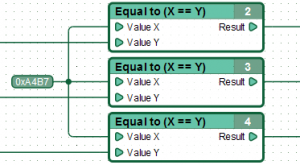| This documentation is out of date.
The new version of the documentation is here: https://cannylogic.com/docs |
Difference between revisions of "Constant"
| [unchecked revision] | [unchecked revision] |
(→Examples) |
|||
| Line 36: | Line 36: | ||
== Features == | == Features == | ||
| − | Prior to CANNY Lab version 1.0, sending constant to the register of the controller was possible only by using functional block "Constant value assignment", | + | Prior to CANNY Lab version 1.0, sending constant to the register of the controller was possible only by using functional block "Constant value assignment", as seen on many early video demonstrations [http://www.youtube.com/channel/UCaYNvBE72LYxQQz1PSY5SCQ videos of CANNY Lab]. With the release of CANNY Lab ver. 1.0, this step has been simplified. |
== Examples == | == Examples == | ||
Revision as of 03:25, 23 November 2015
| Appearance | |
|---|---|
| Symbol | |
| := | |
| Group | |
| Set and Copy | |
| Version CANNY Lab | |
| from 1.0 |
Special functional diagram element allows to set networks or register initial constant values for entire operation time of the diagram. Most often, this element is used to configure controllers' hardware resources or functional diagram parameters initiation. Constants can be set manually to use in arithmetic and logical operations in various numbering systems, using constants setting dialogue установки значения константы or using constants set values for some of the registers in the controller, by selecting from constants directory справочника именованных констант.
Features
Prior to CANNY Lab version 1.0, sending constant to the register of the controller was possible only by using functional block "Constant value assignment", as seen on many early video demonstrations videos of CANNY Lab. With the release of CANNY Lab ver. 1.0, this step has been simplified.

